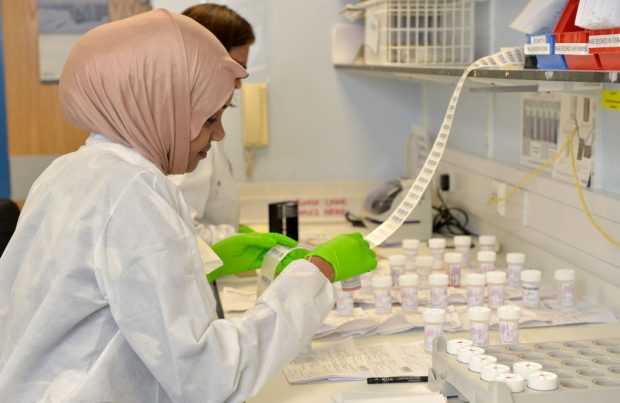Cervical screening aims to detect abnormal cells in the cervix that could, if undetected and untreated, develop into cervical cancer. If screening finds these cells we can refer women for effective treatment.
National policy and guidance
PHE is responsible for setting policy and guidance for the NHS Cervical Screening Programme (CSP).
To make sure we have clinical expertise to support and advise the programme we have clinical professional groups (CPGs) for laboratories, colposcopy, education and training.
These groups, set up in 2016, work closely with the national programme and the national advisory committee for cervical screening. They offer advice on aspects of cervical screening and carry out work for the advisory committee.

Membership of CPGs is drawn from clinical and scientific professional organisations, the national programme, the screening quality assurance service (SQAS) and colleagues in Wales, Scotland and Northern Ireland.
PHE appoints the CPG chairs and they offer practical and clinical advice on:
- current issues
- programme guidance
- how best to achieve the programme’s overall aims
Education and training group
Catherine Witney, an education manager at Public Health England (PHE), chairs the cervical screening education and training (CSET) CPG.
This group addresses the education and training needs of cervical sample takers and cytology laboratory staff who screen and report cervical samples.
Catherine is leading on developing training resources to ensure staff working in the programme are prepared for the implementation of HPV primary screening.
Catherine said:
High on the list of priorities is making sure staff are updated on the changes to the screening pathway as part of the implementation of HPV primary screening into the programme. The English cervical screening programme is known to be one of the best in the world and the training and education of our workforce is a vital element of that. Whatever changes take place in the coming months and years, we will continue to support a highly trained and competent screening workforce.
National e-learning resource
The national programme successfully launched a national e-learning resource for sample takers in October 2017. The CSET CPG is responsible for keeping this resource updated in line with national programme professional guidance.
The e-learning is designed to meet the 3-yearly update training requirement for sample takers working in the CSP. The module is free to access and is hosted on the E Learning for Health website.
Since the module was launched it has been the most visited of all the PHE screening e-learning resources and user feedback has been very positive.
Sample taker training for GPs
The CSET CPG has embarked on a number of initiatives to address concerns over the lack of access to and availability of sample taker training for general practitioners (GPs). We are currently evaluating a training course for GPs at ST2 level (year 2 general practice speciality training) using a modified model of the national programme guidance.
Lab group
Consultant cytopathologist Dr Steve Ferryman chairs our laboratory CPG. He is leading the work on developing updated guidance for laboratories that provide HPV testing and cytology services in cervical screening.
This new guidance document will replace the third edition of Achievable standards, benchmarks for reporting and criteria for evaluating cervical cytopathology when the test for human papilloma virus (HPV) is implemented as the primary screening test in the NHS CSP.
It will also replace the national guidance for laboratories participating in the NHS CSP.
Dr Ferryman said:
The laboratory CPG has highly experienced members who are very passionate about the cervical screening programme. Adherence to laboratory standards has been very important in assuring the quality of services and developing a world class screening programme. The CPG has developed new failsafe guidance, is updating national histopathology guidance and approved the new guidance on the role of cervical screening provider leads. The new era of primary HPV testing will be very challenging and we will need to consider data from the pilot sites and the new testing laboratories to introduce new standards.
Colposcopy group
John Tidy, professor of gynaecological oncology, chairs the colposcopy CPG.
He is leading the work to update national guidance for colposcopy and programme management in readiness for the implementation of HPV primary screening.
Prof Tidy said:
The colposcopy CPG has been working through the proposed changes to the screening programme in light of the change to primary HPV screening. The group is now developing a new guidance document for colposcopy practice to reflect the changes which will form the backbone for quality assurance of colposcopy practice within cervical screening.
Thank you
As we develop cervical screening into a HPV primary screening programme, all the CPGs are working hard with the national programme team to develop new guidance, revise existing guidance and advise on data reports and trends.
We really value and appreciate the continued professional support and expertise of CPG members which has provided the foundation for cervical screening in England.
PHE Screening blogs
PHE Screening blogs provide up to date news from all NHS screening programmes. You can register to receive updates direct to your inbox, so there’s no need to keep checking for new blogs.
2 comments
Comment by Julia Tugwell posted on
Do you have any 'expert patients' on your CPG's?
Comment by Andrew Anderson posted on
Hi Julia - membership of clinical professional groups is drawn from clinical and scientific professional organisations.
Best wishes